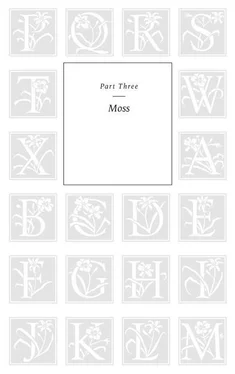Vanessa Diffenbaugh - The Language of Flowers
Здесь есть возможность читать онлайн «Vanessa Diffenbaugh - The Language of Flowers» весь текст электронной книги совершенно бесплатно (целиком полную версию без сокращений). В некоторых случаях можно слушать аудио, скачать через торрент в формате fb2 и присутствует краткое содержание. Жанр: Старинная литература, на английском языке. Описание произведения, (предисловие) а так же отзывы посетителей доступны на портале библиотеки ЛибКат.
- Название:The Language of Flowers
- Автор:
- Жанр:
- Год:неизвестен
- ISBN:нет данных
- Рейтинг книги:4 / 5. Голосов: 1
-
Избранное:Добавить в избранное
- Отзывы:
-
Ваша оценка:
- 80
- 1
- 2
- 3
- 4
- 5
The Language of Flowers: краткое содержание, описание и аннотация
Предлагаем к чтению аннотацию, описание, краткое содержание или предисловие (зависит от того, что написал сам автор книги «The Language of Flowers»). Если вы не нашли необходимую информацию о книге — напишите в комментариях, мы постараемся отыскать её.
The Language of Flowers — читать онлайн бесплатно полную книгу (весь текст) целиком
Ниже представлен текст книги, разбитый по страницам. Система сохранения места последней прочитанной страницы, позволяет с удобством читать онлайн бесплатно книгу «The Language of Flowers», без необходимости каждый раз заново искать на чём Вы остановились. Поставьте закладку, и сможете в любой момент перейти на страницу, на которой закончили чтение.
Интервал:
Закладка:
Mid-August, exhausted from an unrelenting summer wedding schedule and equally unrelenting thoughts of my daughter, Elizabeth, and Grant, I retreated to the blue room. For the first time since starting Message, I locked all six locks and slept through every appointment on our calendar. Marlena covered for me. The whistle of the kettle drifted into my dreams as she prepared tea for our clients, but I didn’t emerge. The locks kept me from climbing into my car and driving straight to the water tower, racing to the third floor, and taking my baby back. In my fantasies, she still lay helpless in her basket, staring up at the ceiling. In reality, she would be six months old, sitting up, reaching out, and maybe even crawling across the floor.
I stayed in the blue room for nearly a week. Marlena did not disturb me, but each morning she slid a photocopied sheet of paper through the crack under my door. It was our September calendar, the squares growing increasingly crowded as the days passed. I had expected business to taper off as the weather cooled, but if anything, we seemed to be getting busier, and my anxiety over the mounting work finally surpassed my depression. I grabbed a banana from a fruit bowl Marlena had filled and walked downstairs.
Marlena sat at the table, chewing the end of a pen. She smiled when she saw me.
“I was about to go to The Gathering House,” she said, “and hire another assistant.”
I shook my head. “I’m here. What’s first?”
She scanned the calendar. “Nothing major until Friday. But then we have to work sixteen days straight.”
I groaned, but in reality I felt relieved. Flowers were my escape. With flowers in my hands, perhaps I could survive the fall. And maybe, as the months passed, things would get easier. It was what I had expected, but so far it hadn’t proven to be true. In fact, the opposite seemed to be occurring; with each passing day, I felt more desolate, the consequences of my decisions less bearable. I turned to walk back upstairs.
“Going back to your cave?” Marlena asked. She sounded disappointed.
“What else would I do?”
Marlena exhaled. “I don’t know.” She paused, and I turned back around. It seemed she did know but was having trouble finding the words. “There’s a new sandwich shop next to Bloom,” she said finally. “I thought maybe we could grab some lunch and then go for a drive.”
“A drive?”
“You know.” She looked out the front windows to the street. “To see her.”
Marlena meant my daughter. But for a split second before I realized this, I thought she meant Elizabeth, and it seemed to me to be exactly the thing I needed to do. I knew where she lived, and I knew how to get there. It might be too late to be a child in her home, but it wasn’t too late to apologize for what I had done.
When I didn’t respond right away, Marlena looked to me, her expression hopeful.
I shook my head. I’d asked her never to speak of my daughter, and until now, she’d done as I’d asked. “Please don’t,” I said.
Her chin dropped to her chest, and she looked for a moment as neckless as a newborn.
“I’ll see you on Friday,” I said, turning to walk up the stairs.
All night I imagined driving to see Elizabeth. I pictured the long, dusty driveway, the late-summer grapes heavy on the vines. The afternoon sun would cast a rectangular shadow from the peeling white farmhouse, and the porch steps would squeak as I climbed them. At the kitchen table, Elizabeth would sit with her arms folded, her eyes on the door, as if she’d been waiting for me.
The vision shattered with the realization that all this could be gone. Not only the acres of vines but also the kitchen table, the screen door, the entire house. In all the time I’d spent with Grant, I’d never once asked him how much damage the fire had caused, and I’d never driven down the road past the entrance to the flower farm. I hadn’t wanted to know.
I couldn’t go. I couldn’t bear to see it, not even to apologize to Elizabeth.
But once sparked, I couldn’t let go of the idea. If I could apologize, then maybe, finally, I could forget. Maybe my dreams would cease and I could settle into a quiet, if lonely, life, knowing Elizabeth understood my remorse. Huddled in the blue room, I thought about how to accomplish the task. It would be simple enough to write a letter. Once I’d learned the address, I’d never forgotten it. But I couldn’t write my return address on the envelope without fear of Elizabeth showing up at my door, and without a return address, Elizabeth couldn’t answer my letter. Though I didn’t think I could live looking constantly out the window, half expecting her old gray truck to pull up to the curb, I wanted desperately to know her response. Written, I could handle her anger, her disappointment. It might even bring some relief from the years of guilt.
When the sun rose I knew what I had to do: I would write Elizabeth a letter and use Bloom as the return address. Renata would bring me a letter if one arrived. Inching open the door of the blue room, I listened for sounds of Marlena. The apartment was quiet. Walking downstairs, I sat at the table as I would during a flower consultation, reaching for a sheet of rice paper and a blue felt-tip pen. My hand shook as the pen hovered above the paper.
I wrote the date first in the upper-right-hand corner, as Elizabeth had taught me to do. Still trembling, I scrawled her name. I couldn’t remember if a colon or a comma should follow; after a pause, I put both. I looked down at what I had written. My script was sloppy from nerves, a far cry from the perfection Elizabeth had always demanded. I crumpled the paper and threw it to the floor, starting again.
An hour later I reached for my last piece of paper. Balled attempts littered the room all around me. This one, no matter what, would have to do. The pressure of the final sheet made my hand shake even more, and my handwriting looked like that of a young child, unsure of the shape of each letter. Elizabeth would be disappointed. Still, I continued, slowly, purposefully. Finally, I succeeded in inking out a single line: I lit the fire. I’m sorry. I’ve never stopped being sorry .
I signed my name. The letter was short, and I worried Elizabeth would think it rude or insincere, but there was nothing else to say. I folded the paper into an envelope, and sealed, addressed, and stamped it. The stamps I had purchased the previous spring held a drawing of a daffodil— new beginnings— yellow and white on a red background, gold letters celebrating the Chinese New Year. Elizabeth would notice.
Walking quickly to the end of the block, I pulled the heavy metal handle of the mailbox, dropping the letter through the slot before I had time to change my mind.
2 .
On an afternoon in September I sat in the cavernous office space, checking the alphabetization of my cards out of habit and waiting for a couple to arrive. The couple would not marry until the following April but had insisted on meeting with me now. The bride wanted to coordinate everything—from the color of the place settings to the words in the song of their first dance—to her flower choices. Over the summer I had worked with countless brides, but coordinating music and flowers was new even to me. I was not looking forward to the meeting.
I checked my watch. Four forty-five. Fifteen minutes until my clients were set to arrive. It was time to make tea. I drank only a strong chrysanthemum tea I bought in Chinatown, the blossoms uncurling and suspending in the dark liquid. It was a nice touch for my sessions, and something my clients had come to expect.
In the kitchen, I brewed a pot and drank a cup before descending the stairs. The bride had arrived, sitting on the stoop in front of the glass doors. She sat alone, looking up and down the street. In the straight line of her back I could see her impatience. Her fiancé was late or absent. It was a bad sign for a marriage, and brides knew it. The long-term success of my business, I had decided months before, was dependent on the fact of arranging flowers only for couples whose marriages would last; I’d refused more than one couple for tardiness or spiteful conversations over the cards.
Читать дальшеИнтервал:
Закладка:
Похожие книги на «The Language of Flowers»
Представляем Вашему вниманию похожие книги на «The Language of Flowers» списком для выбора. Мы отобрали схожую по названию и смыслу литературу в надежде предоставить читателям больше вариантов отыскать новые, интересные, ещё непрочитанные произведения.
Обсуждение, отзывы о книге «The Language of Flowers» и просто собственные мнения читателей. Оставьте ваши комментарии, напишите, что Вы думаете о произведении, его смысле или главных героях. Укажите что конкретно понравилось, а что нет, и почему Вы так считаете.












